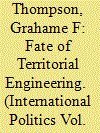| Srl | Item |
| 1 |
ID:
078483


|
|
|
|
|
| Publication |
2007.
|
| Summary/Abstract |
Does there exist a genuine threat to the continuation of a broadly liberal international (and domestic) order, driven by the re-emergence of religious and secular fundamentalisms? This article assesses this issue in the context of first the rise of territorial power and then its fate in a period of globalization and the revival of religious intolerance. The twin concepts of sovereign-power and bio-power are deployed to investigate the emergence of territorial engineering in the 17th century. A key feature of modern fundamentalisms is that they promote and trade on the deterritorialization of social, political, cultural and economic activity. It is argued that this is a manifestation of a new form of 'spirited martial power'. The risks associated with these developments should not be over-exaggerated but they exist nonetheless. If this is the case, the problem becomes one of how to re-territorialize the activities and disputes engendered by this reappearance and re-emergence of spirited martial power in the international system, with all its attendant links to religious fundamentalisms. Here the argument is that this requires a re-examination of the nature of international borders, and indeed a re-emphasis on their role, not just in respect to containing disorder and restoring the capacity for governance, but also as a way of re-configuring international toleration and of righting a wrong
|
|
|
|
|
|
|
|
|
|
|
|
|
|
|
|
| 2 |
ID:
106663


|
|
|
|
|
| Publication |
2011.
|
| Summary/Abstract |
As successors to structural adjustment programmes, Poverty Reduction Strategy Papers (prsps) were introduced in 1999 as preconditions for World Bank and imf concessional financing and for debt relief. prsps now serve as the basis of negotiations for a variety of development financing and have influenced the design of other aid instruments. This paper considers the impact of the prsp framework on the constitution of global economic governance, in particular its effect in foreclosing possibilities for a radical revision of the rules and institutions of international economic law. The paper argues that the prsp project not only reframes fundamental tenets of international co-operation and global communal responsibility but also establishes a new disciplinary framework for Third World state engagement with the global economy and the international law which sustains it. In this way the discourse and methods of resistance against the injustices of the international order have been appropriated to distil such dissent through qualified operationalising of contestable notions of 'participation', 'ownership', 'partnership' and 'poverty reduction', disabling the resurgence of any form of emancipatory politics in the international economic order, whether through a state-led nieo-style revival or cosmopolitan social movement.
|
|
|
|
|
|
|
|
|
|
|
|
|
|
|
|